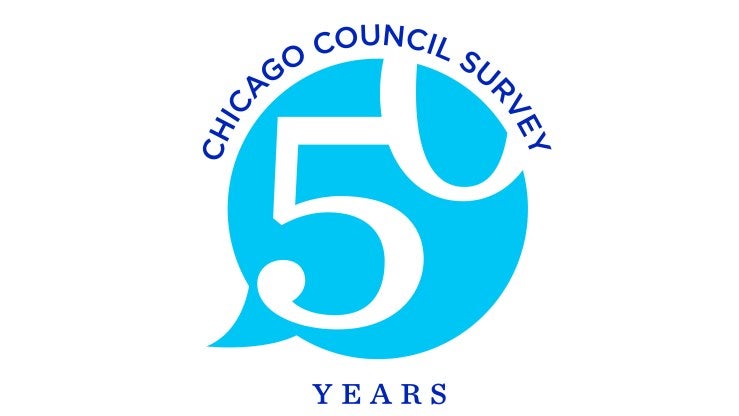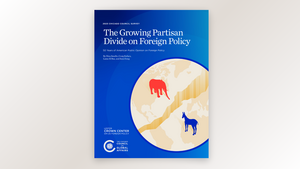But as the humanitarian crisis in Gaza worsens, Democrats and Independents say US support for Israel has gone too far.
Israel’s unprecedent strike against a delegation of Hamas negotiators in Qatar—an ally of the United States and a chief mediator in talks between Israel and Hamas—has greatly complicated negotiations toward a ceasefire in the ongoing conflict. Both the Doha attack and offensive in Gaza City have been criticized by Western allies and segments of the Israeli public. Despite US President Donald Trump’s recent frustration with Israeli Prime Minister Benjamin Netanyahu, he has maintained unwavering support for Israel since taking office.
The 2025 Chicago Council Survey, fielded July 18–30, 2025, finds pluralities of Americans—including self-described Democrats and Independents—think the United States is providing Israel with too much support and military aid in its war against Hamas. However, shifts in Republican views suggest they are more satisfied with the direction of US-Israeli relations now that Trump is in office and has reversed many of the policies of former President Joe Biden.
Key Findings
- Compared to 2024 Chicago Council polling, more Americans now say the United States supports Israel too much in the Israel-Gaza war (37%, up from 30%).
- More Democrats now say the United States supports Israel too much (53%, up from 40%), as do more Independents (42%, up from 34%). In contrast, more Republicans now say the United States strikes the right balance in its support (47%, up from 23%).
- Four in 10 Democrats (45%) and Independents (41%) believe the United States sends Israel too much military aid. In contrast, Republicans think the United States provides the right amount (46%).
- When asked about humanitarian aid to the Palestinians, Democrats (60%) and Independents (43%) tend to share the view that the United States needs to send more. Republicans who offer an opinion are most likely to say the United States has given an appropriate amount of aid to the Palestinians (34%).
- Majorities of Democrats (63%) and Independents (53%) support the establishment of an independent Palestinian state while a majority of Republicans continue to oppose it (58%).
- In general, Independents tend to resemble Democrats more than Republicans in their preferences for US policy toward the Israel-Gaza war.
Republicans Now Say US Support for Israel Strikes the Right Balance
Despite cutting billions of dollars in foreign assistance and pulling back from several international organizations under the auspices of his “America First” agenda, Trump has bolstered US military, economic, and diplomatic support for Israel since returning to the Oval Office.
In response, Democrats and Independents have grown more convinced over the past year that the United States is supporting Israel too much (from 40% to 53% among Democrats and from 34% to 42% among Independents). Republicans, meanwhile, are now more likely to say the United States is striking the right balance in its support for Israel (47%, up from 23%)—a major shift from 2024, when the plurality said the United States was not supporting Israel enough (40%). Republican attitudes may signal endorsement for the Trump administration’s increase in arms sales and diplomatic support for Israel over the last few months. However, a small share of Republicans still considers US support insufficient (14%).
Overall American public opinion is slightly more likely to lean toward the view that US support for Israel is too much (37%, up from 30% in 2024—driven by increases in the attitudes of Democrats and Independents). However, a quarter considers the United States to be striking the right balance (26%, driven by an increase in the attitudes of Republicans), and 10 percent think it is not supporting Israel enough (down from 20%).
Plurality of Americans Wants to Reduce US Military Aid to Israel
Military aid constitutes a significant part of US support for Israel. To date, the Trump administration has reversed the Biden administration’s partial arms embargo on Israel, bypassed Congress to expedite the delivery of $4 billion in military assistance, and approved nearly $12 billion in major arms sales. This is all while major US allies, like Germany and the United Kingdom, have suspended some arms exports and other military aid to the Israeli government in response to the rising number of civilian casualties in Gaza.
A plurality of the American public thinks the United States sends too much military aid to Israel (37%). Three in 10 consider US military assistance to Israel the right amount (30%). Fewer now say the United States doesn’t send Israel enough military aid (10%, down from 17% in 2024).
The drop in the share of those who say US military aid to Israel is not enough is most pronounced among Republicans (12%, down from 34%), who are now more likely to say the United States sends the right amount (46%, up from 29%). Similar to last year, pluralities of Democrats and Independents think the United States provides too much military aid to Israel (45% and 41%, respectively).
Americans See Greater Need for Humanitarian Aid in Gaza
When an earlier round of ceasefire negotiations between Israel and Hamas fell apart in March 2025, Israel halted all humanitarian aid and fuel deliveries from entering the Gaza Strip to pressure Hamas to release remaining hostages. Although the blockade was partially lifted, humanitarian conditions have rapidly deteriorated, and reports now confirm that over half a million Gazans are suffering from famine.
More Americans now believe the United States is not providing Palestinian civilians with enough humanitarian aid (40%, up from 30% in 2024). Democrats (60%, up from 44%) and Independents (43%, up from 31%) are even more likely now than a year ago to think US humanitarian aid to Gaza is insufficient. While more Republicans are convinced the United States sends the right amount (34% vs. 31% in 2024) than too little (11%, down from 15%), those who are unsure (37%, up from 26%) have also increased.
American Support for Palestinian Statehood Remains Stable
Deteriorating humanitarian conditions in Gaza have led several allies of the United States—namely France, Canada, the United Kingdom, and Australia—to announce their intentions to recognize an independent Palestinian state during the upcoming United Nations General Assembly. Despite mounting pressure, the Trump administration continues to oppose Palestinian statehood, equating it to “rewarding Hamas at a time where Hamas is the true impediment to a ceasefire and the release of all the hostages,” according to White House Press Secretary Karoline Leavitt.
Five in 10 Americans support the establishment of an independent Palestinian state in the West Bank and Gaza Strip (51%), while four in 10 oppose it (41%). Majorities of Democrats (63%) and Independents (53%) favor Palestinian statehood, while a majority of Republicans oppose it (58%). Notably, however, more Republicans tend to favor an independent Palestinian state now than in 2024 (35%, up from 27%).
Few Americans Have Opinion on Israeli Settlements
Despite their illegality under international law, Israelis continue to expand settlements in the West Bank with support from the Israeli government. These settlements effectively block Palestinian statehood by fragmenting the land connecting Ramallah in the north to East Jerusalem and Bethlehem in the south. While the settlements are not new—they have been constructed since 1967—their numbers have sharply increased since the conflict between Israel and Hamas erupted in late 2023 after the October 7 Hamas attack. The Biden administration had sanctioned more than 30 Israeli settlers and settlement development organizations, but Trump quickly lifted those sanctions upon his return to the White House in 2025.
Nearly half of Americans (48%; including 53% Republicans, 46% Independents, and 45% Democrats) have not heard enough about Israeli settlements to say whether they are acceptable or not. However, among those who do provide an opinion, more consider the settlements unacceptable (35%) than acceptable (16%). Those Democrats and Independents who provide an opinion consider the settlements unacceptable (47% and 40% respectively) compared to just 15 percent of Republicans, who tend to say they are acceptable (30%).
Conclusion
Taken together, data from the 2025 Chicago Council Survey reveal a strong and growing partisan factor in American views of US support for Israel in its war against Hamas. While Democrats and Independents have become even more critical of the United States’ unconditional backing, Republicans are increasingly satisfied with the level of support. Against the backdrop of famine in Gaza, the Trump administration’s crackdown on pro-Palestinian activism and US Secretary of State Marco Rubio’s recent show of support for Israel are likely to further entrench these partisan divisions and intensify domestic polarization on this issue.
This analysis is primarily based on data from the 2025 Chicago Council Survey of the American public on foreign policy, a project of the Lester Crown Center on US Foreign Policy.
The 2025 Chicago Council Survey was conducted July 18–30, 2025, by Ipsos using its large-scale nationwide online research panel (KnowledgePanel) in English and Spanish among a weighted national sample of 2,148 adults 18 or older living in all 50 US states and the District of Columbia. The margin of sampling error for the full sample is ±2.2 percentage points, including a design effect of 1.07.
Partisan identification is based on how respondents answered a standard partisan self-identification question: “Generally speaking, do you think of yourself as a Republican, a Democrat, an Independent, or what?”
The 2025 Chicago Council Survey is made possible by the generous support of the Crown family and the Korea Foundation.
Additional results reported from March 2025 are from a Chicago Council on Global Affairs-Ipsos survey conducted March 14–16, 2025 by Ipsos using its large-scale, nationwide, online research panel (KnowledgePanel) among a weighted national sample of 1,021 adults 18 or older living in all 50 US states and the District of Columbia. The margin of sampling error for the full sample is ±3.2 percentage points including a design effect of 1.09.
The data for the total sample were weighted to adjust for gender by age, race/ethnicity, education, Census region, metropolitan status, and household income using demographic benchmarks from the 2024 March Supplement of the Current Population Survey (CPS). The specific categories used were:
- Gender (Male, Female) by Age (18–29, 30–44, 45-59 and 60+)
- Race/Hispanic Ethnicity (White Non-Hispanic, Black Non-Hispanic, Other, Non-Hispanic, Hispanic, 2+ Races, Non-Hispanic)
- Education (Less than High School, High School, Some College, Bachelor or Higher)
- Census Region (Northeast, Midwest, South, West)
- Metropolitan Status (Metro, Non-Metro)
- Household Income (Under $25,000, $25,000-$49,999, $50,000-$74,999, $75,000-$99,999, $100,000-$149,999, $150,000+)





Related Content
 US Foreign Policy
US Foreign Policy
Results and analysis of the Council's 2025 annual survey of American views on foreign policy.
 Public Opinion
Public Opinion
Republicans support US backing for Israel until its military objectives in Gaza are achieved, while majorities of Democrats now oppose it.
 Public Opinion
Public Opinion
"Israel’s worst-case scenario would be to find itself in the same boat as apartheid-era South Africa in the 1980s," Daniel Drezner writes.

